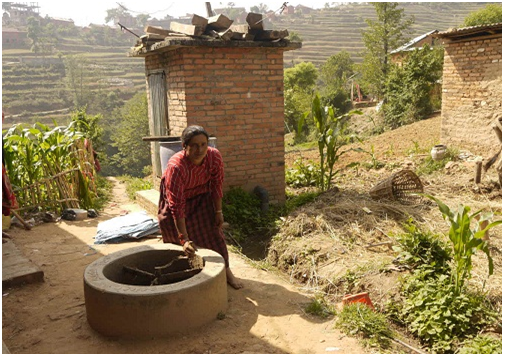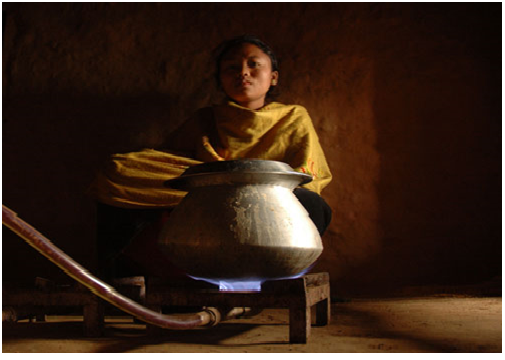Re-building community by supporting biogas and biomass-based clean cookstove program in some earthquake affected areas of Kavre, Nepal
Installation of biogas and biomass-based clean cookstoves will help lower the level of household air pollution (HAP), and incidence of several diseases associated with HAP.
Biomass-based CleanCook
Appeal
An appeal to colleagues around the world to help us bring healthier household environments to Nepal earthquake victims!!.
As many of you know, we have been helping Nepali colleagues with a cohort study (PEER Health Study) comparing child pneumonia rates in village households with biogas cooking and those using open wood-fired cookstoves. This study is in Kavre district, about 90 minutes east of Kathmandu, which was heavily affected in the recent earthquakes, which killed nearly 9 thousand people in Nepal. Among our 550 study households, damage assessment showed that 394 houses suffered minor or major cracks and 156 houses were completely destroyed. Three study infants and three mothers were killed. The earthquake also completely destroyed 20 biogas plants, and partially damaged 180. Eighty of the damaged biogas plants have been fixed, but due to lack of resources, 100 households have not been able to repair their biogas systems. {the destroyed and damaged houses themselves are being rebuilt fairly steadily now with government and other aid)
Although suspended for two months, field work in our PEER study has now resumed. Weekly morbidity assessment and regular air pollution monitoring of 547 children are ongoing. Unfortunately, however, about 120 households with completely or partially damaged biogas plants have reverted to using the open wood-fired cookstove, called the Chulo. From our air pollution measurements, this means that the PM2.5 exposures of the young children in those households have more than doubled due to the earthquakes, since biogas is a quite clean cooking fuel that is well-liked and used faithfully in these villages.
Recognizing that we have a responsibility to assist the households in our study who have suffered due to the disaster, we are planning to help rebuild 20, and fix 100 partially damaged, biogas plants, bringing those households back to the lower pollution exposures they had previously enjoyed, or even lower. In addition, as the study winds down, we have committed to install new biogas plants in the 100 Chulo-using households (the “control “group in our study, although this is an observational study not an RCT), who have enough cattle to operate small biogas systems but not enough money to install the system by themselves. Finally, for the remaining 166 Chulo-using households, who don’t have the two cattle needed to operate a biogas plant, we have committed to installing the best available clean and efficient biomass cookstoves. [we are also plan to install the best available 4 m3 biogas systems that provide effective sanitation as well as clean cooking fuel and are better sized to provide enough gas so that the traditional open stove does not have to be used often — an upgrade for many households]
The funder of the research project does not wish to assist in this humanitarian effort, but is allowing the project to adjust its monitoring objectives to measure the air pollution and, potentially, reveal some health implications of the changes in household cooking systems as they occur. Thus, there will, we hope, be a scientific output from the relief effort.
The relief effort will take advantage both of contributions from the Nepalese government programs in biogas plants and stoves and contributions in labor and materials from the households themselves. Thus, the funds we hope to raise will be highly leveraged.
We will be posting a more complete description of the relief plans on the website bellow, but here we want to emphasize that the field effort will be undertaken by Leaders Nepal, an established, well regarded, experienced, and competent NGO. Being the implementing organization for the PEER study fieldwork, they are well placed to take this on and have the needed connections both with the local communities and the Nepalese government.
Dr. Amod Pokhrel here in Berkeley will manage the international aspects of this relief project including being responsible for raising and dispersing the funds and maintaining the accounts. We hope to keep the administrative costs as low as possible with at least 80% of raised funds being spent in the villages, but in an ad-hoc effort like this, there will be need for some funds for management, logistics, facilitation, and monitoring.
We are thus appealing to the international HAP community to support this effort to help these 547 households acquire clean household environments and efficient renewable energy systems in the aftermath of this natural disaster. We believe that US$120,000 will enable us to complete the tasks outlined.
To assist contributors from the USA, we are utilizing a “fiscal” sponsor, the Bay Area Nepali Women Organization , a registered 501-3c organization, so that donations can be tax deductible under US law. Contributors from other countries can use the same website.
We hope you will consider this a worthy cause and donate by credit card at [url] or by sending checks to the address shown on the website. There is also a link on Kirk’s website below.
We welcome comments, questions, and suggestions and, with many thanks for your support, we are
Sharat Verma, MPH, MD (PI, PEER Health Study)
Dhiraj Pokhrel (Leaders Nepal)
Amod Pokhrel, MS, PhD.
Kirk R. Smith, MPH, PhD



